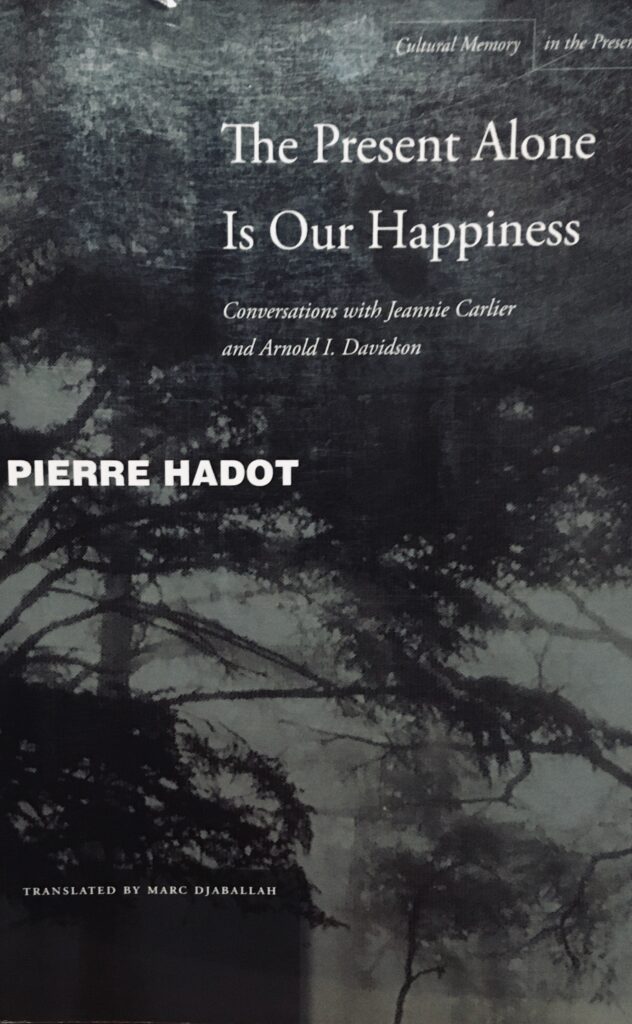Dear Fräulein Sabine,
I read a book I think you might appreciate (as if you don’t have enough to read with your Civil Engineering course and your Higher Mathematics course and your reading Spinoza for pure pleasure stimulus, albeit in English (or Deutsch) translation (Wheelock’s Latin is a good place to start, I hear).
The book is Pierre Hadot’s The Present Alone is Our Happiness, a collection of interviews with the French historian of ancient philosophy. From his studies, he finds the Romans and Greeks as seeing philosophy not so much as philosophical discourse, but a commitment to a way of life; the aim isn’t information, but formation; it’s not so much theory as therapy.
Philosophy back then was typically recorded as the interaction between a teacher and his students, rooted in specific questions, with a particular context, in this or that locale. Hadot states, “Greek philosophers did not aim, above all, to provide a systematic theory of reality, but to teach their disciples a method with which to orient themselves, both in thought and in life.” [90]
A major theme in this volume, as in several of Hadot’s works, is the centrality of spiritual exercises, “voluntary, personal practices meant to bring about a transformation of the individual, a transformation of the self.” [87] Doesn’t this remind you of your Spinoza, Ethics, part 5?
One such exercise is the view from above, which “consists in imaginatively going over the immensity of space, and the accompanying movement of the stars, but also at looking at the Earth from above, and observing the behavior of humans…. This exercise aims to allow one to become aware of one’s place in the universe, thus to detach oneself from one’s egotistical point of view, and to lead one to become aware of one’s belonging, not only to the Whole of the universe, but also to the Whole of the human community; to leave a unilateral view of things, to put oneself in the place of others.” [167, 169]
The title of the book is a translation of a passage from Faust, “Die Gegenwart allein ist unser Glück.” Here’s Hadot’s emphasis on being here now (did you ever read that book by Ram Dass?): “Concentration on the present is a concentration on what we can really do; we can no longer change the past, nor can we act on what is not yet. The present is the only moment in which we can act. Consequently, concentration on the present is a requirement of action.” [163]
An acquaintance, a university professor, recently has gotten into Buddhism, and, apropos of the above, we had this recent Facebook exchange:
KN: I have been reading about karma. The karma in popular culture is the kind that is likened to the vengeful old testament God. An eye for an eye. But what I am now reading suggests that Karma is less about morality and more about logic. If you respond to others in meanness, they will most likely respond that way back to you. So, the logical conclusion of anger is more anger. I’m not sure if that interpretation is correct. Does anyone else know or have suggestions on what to read about karma?
MC: read Ayya Khema! “The only thing of any interest to anyone is now. Everything else is like living in dream world, never being totally awake, never quite knowing what’s going on.” — from her book, Being Nobody, Going Nowhere: Meditations on the Buddhist Path
KN Thanks Mark….I will.
KN: But here is where I get confused. If you are always living in the present, how do you work for social change?
MC: But if you aren’t living in the present, how do you work for social change?
Best,
Mark

“MC: But if you aren’t living in the present, how do you work for social change?”
A quote that will be written on a paper and stuck to the wall above my desk for a long time…Thank you Mark!